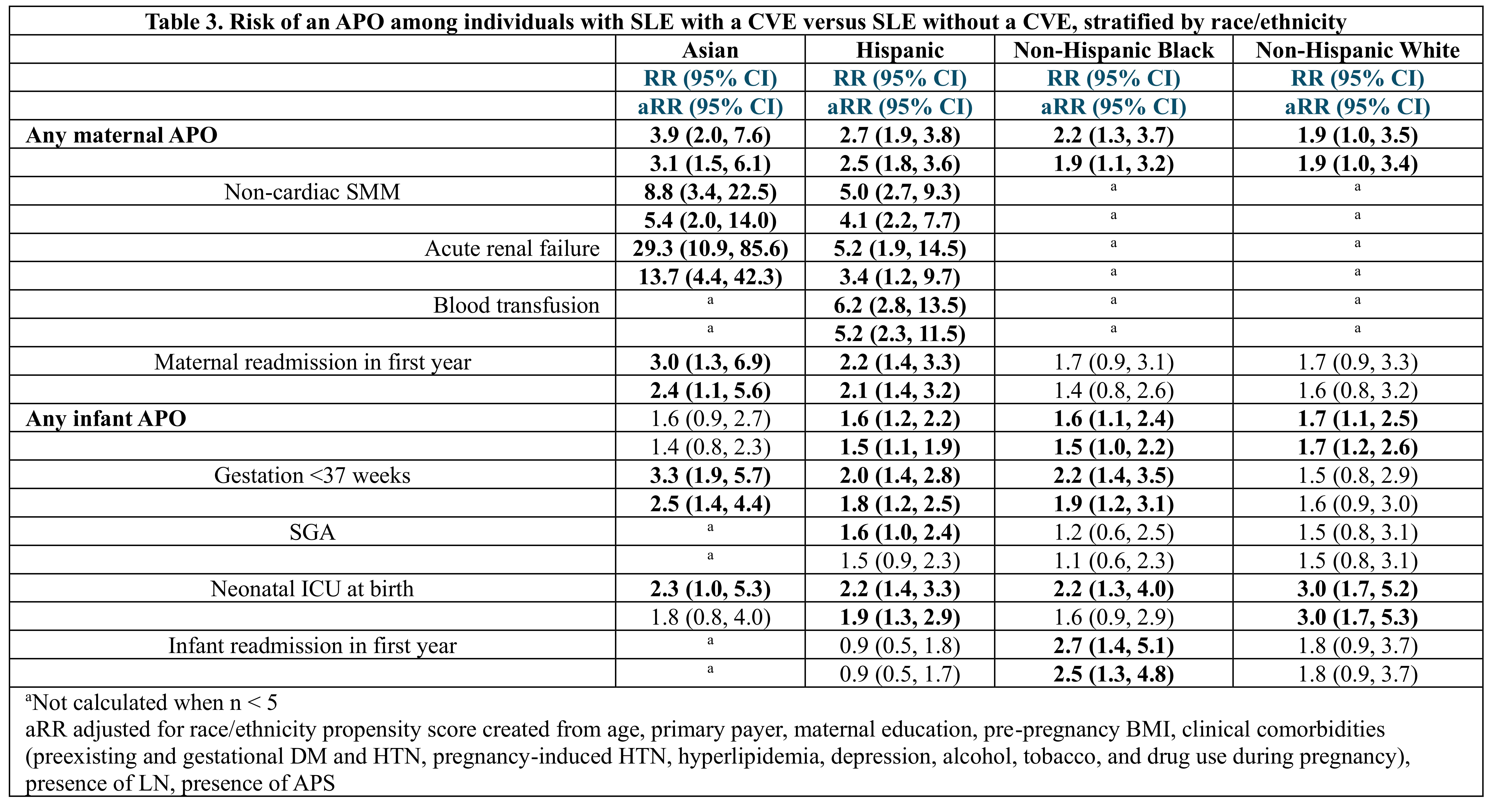Session Information
Date: Tuesday, October 28, 2025
Title: (2195–2226) Reproductive Issues in Rheumatic Disorders Posters
Session Type: Poster Session C
Session Time: 10:30AM-12:30PM
Background/Purpose: Pregnant individuals with systemic lupus erythematosus (SLE) face an increased risk of cardiovascular events (CVEs) as well as adverse pregnancy outcomes (APOs). While racial differences in various SLE outcomes are known, the relationship between race/ethnicity, maternal CVEs, and APOs remains poorly understood.
Methods: Utilizing a California population-based birth cohort from 2005-2020, we identified pregnant individuals with SLE via International Classification of Diseases codes on maternal discharge records. The primary exposure was self-reported race/ethnicity, categorized as Asian, Hispanic, non-Hispanic Black, non-Hispanic White, and Other. Outcomes of interest included the occurrence of CVEs and APOs across racial groups. We also assessed APOs by race, separately for SLE pregnancies with and without CVEs. To assess how CVEs affect APO risk within each race, we estimated adjusted relative risks (aRRs) for APOs in SLE by CVE status for each race category. aRRs were adjusted using a propensity score created for race/ethnicity, incorporating age, payer, maternal education, clinical, and SLE-related variables.
Results: Among 8,422 live-born singletons from women with SLE, majority were from Hispanic (42.7%), followed by non-Hispanic White (27.7%) individuals. Private insurance was more common among Asian (78.7%) and non-Hispanic White (68.6%) women, while Hispanic and non-Hispanic Black patients more often had public insurance (51.4% and 52.2%, respectively). Non-Hispanic Black women had the highest prevalence of hypertensive disorders (Table 1). Compared to other racial groups, non-Hispanic Black women had the highest prevalence of CVEs during pregnancy (4.0% vs 1.6-2.0%), maternal APOs (24.6% vs 13.5-15.6%) and infant APOs (54.6% vs 34.6%-49.4%), including the highest infant death rate (1.8%) (Table 2).Stratified analysis by race/ethnicity and CVE status showed the highest occurrences of maternal and infant APOs in non-Hispanic Black women, regardless of CVE status (23.4% and 42.1% without CVEs; 51.6% and 83.9%, with CVEs, respectively). In non-Hispanic White women, maternal and infant APOs occurred in 13.4% and 27.7% without CVEs, and 25.6% and 58.1% of those with CVEs, respectively. (Table not shown).In the subanalysis, CVEs in SLE were associated with higher risks of most APOs across all groups. The aRR for maternal APOs was 3.1-fold in Asian patients, 2.5-fold in Hispanic patients, and 1.9-fold in both non-Hispanic Black and White patients. For infant APO, aRRs ranged from 1.4- 1.7-fold in SLE pregnancies with CVEs compared to those without, across all groups (Table 3).
Conclusion: CVEs in SLE were linked to higher APO risks. The relative impact of CVEs on maternal APOs was higher for Asian (aRR 3.1) and Hispanic (aRR 2.5) women than the 1.9-fold higher risk of maternal APO observed in non-Hispanic Black and White women with CVEs as compared to those without CVEs. However, non-Hispanic Black women consistently experienced the highest absolute burden of CVEs and maternal and infant APOs, including infant deaths. These findings underscore the importance of integrating cardiovascular disease risk and social determinants of health into the clinical care of pregnant patients with SLE.
 Table 1. Baseline sociodemographic characteristics and clinical comorbidities compared between racial groups in pregnant individuals with SLE, 2005 – 2020
Table 1. Baseline sociodemographic characteristics and clinical comorbidities compared between racial groups in pregnant individuals with SLE, 2005 – 2020
.jpg) Table 2. Cardiovascular events (CVEs) and adverse pregnancy outcomes (APOs) compared between racial groups in pregnant individuals with SLE, 2005 – 2020
Table 2. Cardiovascular events (CVEs) and adverse pregnancy outcomes (APOs) compared between racial groups in pregnant individuals with SLE, 2005 – 2020
.jpg) Table 3. Risk of an APO among individuals with SLE with a CVE versus SLE without a CVE, stratified by race/ethnicity
Table 3. Risk of an APO among individuals with SLE with a CVE versus SLE without a CVE, stratified by race/ethnicity
To cite this abstract in AMA style:
Dhital R, Baer R, Chambers C. Racial Differences in Cardiovascular Events and Adverse Pregnancy Outcomes Among Pregnant Individuals With Systemic Lupus Erythematosus [abstract]. Arthritis Rheumatol. 2025; 77 (suppl 9). https://acrabstracts.org/abstract/racial-differences-in-cardiovascular-events-and-adverse-pregnancy-outcomes-among-pregnant-individuals-with-systemic-lupus-erythematosus/. Accessed .« Back to ACR Convergence 2025
ACR Meeting Abstracts - https://acrabstracts.org/abstract/racial-differences-in-cardiovascular-events-and-adverse-pregnancy-outcomes-among-pregnant-individuals-with-systemic-lupus-erythematosus/
